INFORMATIVE NOTE: The conference is organized in negotiation sessions and side events. Side events are held by organizations representing all sectors of society, they happen inside the conference center or outside. Negotiation sessions can only be attended by parties and the press. Side events inside the conference can be attended by registered participants. Off-site side events can be attended by all. Rice students only attend side events inside and out of the conference center, and follow the negotiations on live stream webcasts.
HIGHLIGHTS:
1. UN manages to make registration Hell on Earth with waiting times up to 6 hours in the Danish cold.
2. Registrants display a great level of resilience and temperance, but one of us falls sick.
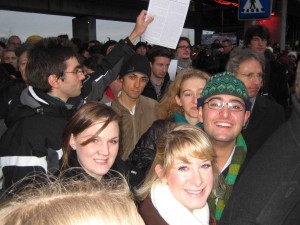
3. Negotiators are incapable to reach agreements and activist outside the Bella Centers protest. In contrast, societal sectors represented inside the conference sport a constructive “let’s get to business” approach and patience over the complexities of the negotiations.
4. Sectors represented in the side events: Agriculture, Manufacturing Industry, Transportation, Finance, NGOs, and the Church.
5. Sectors have well defined programs and little non-sense talk. They identify capabilities, loopholes, and critical needs.
6. Let me say it again: Very constructive attitudes among the sectors (in contrast to the ones among country delegations). All sectors see opportunities. Overall, there is a feeling that it can be done.
7. National institutions also held side events at the different national centers: The US held events on the science while EU focused on policy, technological and financial tools for mitigation and adaptation, reflecting the differences between the stage of negotiation at both sides of the ocean.
8. We meet with Dr. Jerry Schnoor, editor of ES&T, and Dr. Jane Lubchenco, administrator of the National Oceanographic and Atmospheric Administration (NOAA). Dr. Lubchenco gives a talk on the impacts of climate change on the oceans based on NOAA measurements.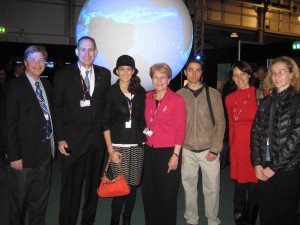
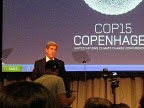 The Wednesday Copenhagen Special: Ban Ki-Moon plus some John Kerry, add a dash of Evo Morales, stir in the environmental ministers of Peru and Ecuador, don’t forget the secret ingredient of Lord Nicholas Stern, and serve with a side of the mayors of Seattle, Mexico City, Copenhagen, Melbourne, Johannesburg, and Bonn.
The Wednesday Copenhagen Special: Ban Ki-Moon plus some John Kerry, add a dash of Evo Morales, stir in the environmental ministers of Peru and Ecuador, don’t forget the secret ingredient of Lord Nicholas Stern, and serve with a side of the mayors of Seattle, Mexico City, Copenhagen, Melbourne, Johannesburg, and Bonn.

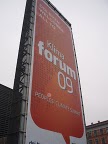 For those groups and citizens that were unable to find an outlet for their research, opinions, and concerns at the COP15 in the Bella Center, there are, thankfully, other venues in the city able to serve them. In fact, the Bella Center has a capacity of 15,000, and more than 45,000 people have registered so far; in the next few days more and more NGO observers and journalists will be excluded from the Bella center as important political figures arrive for the final sessions. Where can the overflow activists and observers head to? Events such as the Klimaforum.
For those groups and citizens that were unable to find an outlet for their research, opinions, and concerns at the COP15 in the Bella Center, there are, thankfully, other venues in the city able to serve them. In fact, the Bella Center has a capacity of 15,000, and more than 45,000 people have registered so far; in the next few days more and more NGO observers and journalists will be excluded from the Bella center as important political figures arrive for the final sessions. Where can the overflow activists and observers head to? Events such as the Klimaforum.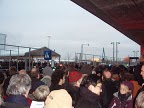 As the news has been heralding, the Bella center is filling to capacity. Yesterday, we stood in line for three hours to register as NGO observers. Once we were inside, though, it certainly was a sight to behold. The Bella center is actually a mash-up of the actual convention center and numerous temporary buildings linked into a single complex. There are halls with booths for NGO groups, meeting halls, open public spaces, and offices for delegations, NGOs, and IGOs (intergovernmental organizations). The pubic spaces are regularly the scene of seemingly-spontaneous protests, while numerous talks, seminars, and side events are held in meeting rooms off of the public halls. As observers, we get to sit in and interact in these side events, hosted by NGOs or UN bodies, and interact with the range of attendants in the center. The range of humanity is impressive, from legions of bright-eyed organizers to delegates from every single country; there are even rock-star moments when figure like Al Gore and Bill McKibben grace the halls. And the actual talks that are supposedly deciding the fate climate change? They are hidden away in meeting halls where few, if any, observers are allowed to enter.
As the news has been heralding, the Bella center is filling to capacity. Yesterday, we stood in line for three hours to register as NGO observers. Once we were inside, though, it certainly was a sight to behold. The Bella center is actually a mash-up of the actual convention center and numerous temporary buildings linked into a single complex. There are halls with booths for NGO groups, meeting halls, open public spaces, and offices for delegations, NGOs, and IGOs (intergovernmental organizations). The pubic spaces are regularly the scene of seemingly-spontaneous protests, while numerous talks, seminars, and side events are held in meeting rooms off of the public halls. As observers, we get to sit in and interact in these side events, hosted by NGOs or UN bodies, and interact with the range of attendants in the center. The range of humanity is impressive, from legions of bright-eyed organizers to delegates from every single country; there are even rock-star moments when figure like Al Gore and Bill McKibben grace the halls. And the actual talks that are supposedly deciding the fate climate change? They are hidden away in meeting halls where few, if any, observers are allowed to enter. 
